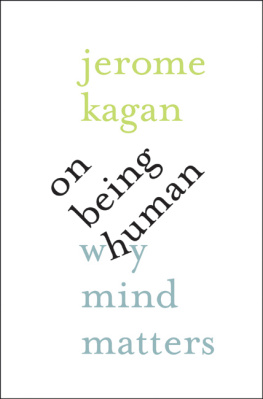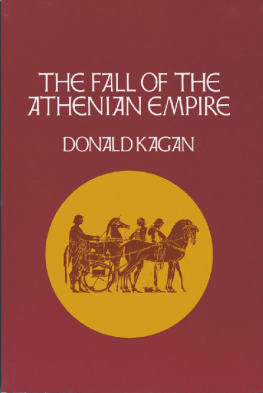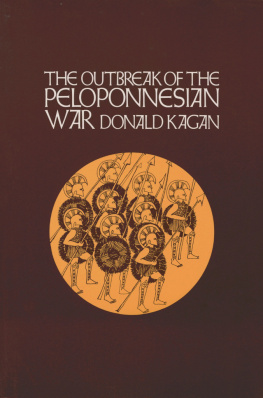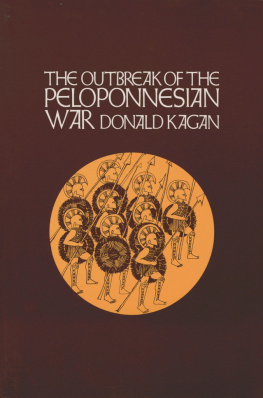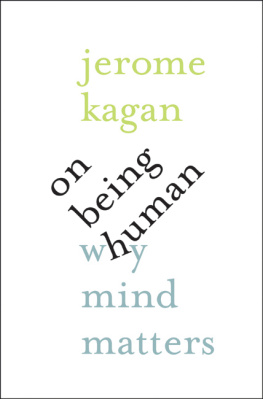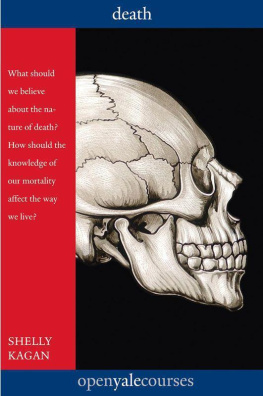ON BEING HUMAN

Published with assistance from the foundation established in memory of Calvin Chapin of the Class of 1788, Yale College.
Copyright Jerome Kagan 2016.
All rights reserved.
This book may not be reproduced, in whole or in part, including illustrations, in any form (beyond that copying permitted by Sections 107 and 108 of the U.S. Copyright Law and except by reviewers for the public press), without written permission from the publishers.
Yale University Press books may be purchased in quantity for educational, business, or promotional use. For information, please e-mail (U.K. office).
Set in Electra type by IDS Infotech Ltd., Chandigarh, India.
Printed in the United States of America.
ISBN 978-0-300-21736-0 (cloth : alk. paper)
Library of Congress Control Number: 2015947641
A catalogue record for this book is available from the British Library.
This paper meets the requirements of ANSI/NISO Z39.481992
(Permanence of Paper).
10 9 8 7 6 5 4 3 2 1
CONTENTS
PREFACE
M ichel de Montaigne was only thirty-eight years old when he retired to his chateau and began to write the essays that are still being read more than four hundred years later. When he died twenty-one years after initiating this task, in 1582, he had filled three volumes with essays whose themes ranged from liars to cannibalism. When I reread some of these narratives on a cold Saturday in March 2013, the thought of composing such a collection relevant to this century evoked a feeling I associate with action. Although considerably older and lacking a chateau, I vowed to adopt my models strategy of avoiding pretense and choosing words with minimal ambiguity. I also decided to free myself, for the first time in fifty-two years of writing scholarly books, of the burden of providing a footnote for the source of every conclusion. Instead, a list of suggested readings is appended at the end of the text.
These essays are best read in the evening, preferably over a glass of wine, as the reflections of a retired academic psychologist who has morphed into a well-fed stowaway admiring the talented crew solving problems he could not have imagined in the summer of 1954 when he left New Haven with his pregnant wife to take his first faculty position at Ohio State University.
Only after typing more revisions than I care to remember did a semblance of structure emerge. What does it mean to know something? which is a complement to Montaignes preoccupying question What do I know? is a seminal theme. This question assumes a special relevance when humans are the knowers because Homo sapiens is the only species that adds words, mathematical concepts, inferences of things that do not exist, and logical deductions to the products of sensation. The initial two essays argue that human knowledge combines representations of the physical features of events, which I call schemata and others call images, with words to form an extraordinarily large number of networks whose patterns of connections change with the setting, much like the collections of contacts among members of a large family from dawn to bedtime.
A person whose knowledge of Alzheimers disease consisted only of the words old, memory, and brain has to be distinguished from the expert whose understanding contains schemata for the varied memory difficulties and density of amyloid plaques in the brains of patients. The social scientists whose only evidence consists of the words people use when they reply to questionnaires or interviews cannot be sure of the depth or the meaning of the knowledge their informants claim to possess.
Too many social scientists treat what people say about their feelings, beliefs, or past lives as faithful replicas of their actual experiences. The fact that most adults are willing to answer a pollster who asks, How has your life been lately? does not guarantee that the reply Very good has the same meaning when given by a happily married, white lawyer in Montreal, an African American health aide who is a single mother earning $25,000 a year working in a nursing home in Atlanta, and an illiterate peasant from rural Bolivia.
The titles of many papers in psychological journals have ambiguous meanings because they contain abstract words that fail to evoke the same networks in all readers. The terms regulate, stress, and maltreatment, which appear often in the titles of psychological articles, are ambiguous because readers activate different networks to these words. By contrast, the terms default network, dorsal stream, and dopamine, which appear in the titles of articles in neuroscience journals, evoke a similar understanding because they are linked to consensual networks. The first two essays elaborate these ideas and the conclusions they imply.
The social scientists habit of using single abstract words to name pro-cesses independent of their context continues to obstruct progress. Each kind of setting selects one particular perception, emotion, thought, or behavior from a collection of candidates that could occur to a question, event, or instruction. A windowless room in a university, the narrow tube of a magnetic scanner, the living room of a home, an Internet cafe, and an airport waiting area generate dissimilar answers from college students asked by a friend or a stranger to report their major worries.
The settings that characterize a persons social class, culture, and historical era have extraordinary power to shape personality traits, abilities, values, and the interpretations of events. The greater prevalence of physical and mental illness among the poor in every society affirms this claim. The details of the procedure a scientist chooses to generate evidence are part of the setting. A single measure reveals only some properties of the phenomenon of interest. A womans description of how she felt when she confronted a group of adolescents in a dark alley and her pattern of brain activity measured in a laboratory when she was asked to recall this event provide different evidence about her state of fear in the alley that night.
Because most behaviors and verbal descriptions can be the result of more than one set of conditions, scientists must collect patterns of measures in order to distinguish among the causal sequences that generate the same outcome. Social scientists are fond of trying to prove that a single condition whose potency depends on being part of a pattern can make a significant contribution to an outcome. The consequences of being bullied as a youth are apt to depend on whether the victim belongs to a minority or a majority group, grew up in a poor or affluent home, is excessively timid or bold, a nerd or a low-achieving student, deferential or bossy, and whether the evidence came from a questionnaire, observations of behavior, or measures of the brain.
The contexts created by historical events, woven into many of the essays, have altered the ease of social mobility, the balance between the individual and the community as the primary beneficiary of action, and sources of unhappiness. Essays 3 and 4 elaborate the influence of contexts, especially settings that characterize social class categories, on human actions, emotions, and beliefs.
The prominence of explanations of human psychological properties that emphasize genes and brains, while excluding thoughts, is another theme. Natural scientists have become reluctant to award thoughts an autonomous influence on human actions because, unlike genes and brain circuits, they are immaterial, cannot be visualized, and are absent in the mice and rats that are frequent targets of study. If thoughts had a partial autonomy from the brain activity from which they emerged, investigators would be forced to question the practice of relying on animal models to illuminate human desires and worries. They could not, for example, equate a rats reaction to being confined in a narrow tube with the response of a single mother of three children who just lost her job. Nor could they assume that the state of a mouse who avoids entering a brightly lit alley resembles the state of an adolescent whose anxiety over a coming examination has led to insomnia. As a result, pharmacological companies could not cite the benevolent effects of a drug on mice who avoid lit alleys as evidence for its effectiveness in reducing anxiety in humans.
Next page
